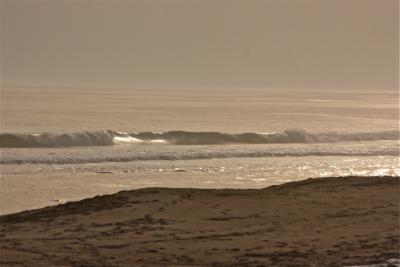Nature Notes: Oceans in Peril

Seven continents and seven oceans. The oceans are encroaching on the continents, eating away at them with increasing ferocity. They now occupy more than 70 percent of our world’s outer skin and by time the next millennium rolls around, they’ll probably cover as much as 80 percent. We have been defacing our 30 percent at an ever-increasing pace ever since the industrial revolution ramped up in the mid-1800s. Our factories and our wars are collectively changing the landscape overnight. Where will it end?
Up until the middle of the last century, we thought our seven seas were too big and too deep to be muddied by land-based activities. We’ve finally come to the conclusion that we were misguided all along, not only by politicians and businessmen, but by the scientists themselves. We know now that not only are the marine waters not immune to what we do so franticly and ineptly on land, they are probably even more vulnerable to corruption and dystrophy than the land masses they surround.
In the last 10 years we have discovered the following signs of around-the-world deterioration of marine environments, both near shore and hundreds of miles offshore: Our piggish habits have generated massive flotillas of plastic and other solid wastes in both the Pacific and Atlantic Oceans. The continued dumping of billions and billions of gallons of wastewater from cities, factories, hospitals, residential areas, and farms into the oceans has begun to cause serious chemical changes, changes that were entirely unpredictable 70 years ago.
When I studied oceanology and oceanography in 1955 at Cornell University, the pH of seawater was considered to be a constant, due to self-buffering and other factors; the oceans would be alkaline forever. The saltiness was also taken as a near constant, a little more than 30 parts per thousand, salt to water. The ocean bottom was believed to be as unsullied as the surface of the continents had been only hundreds of years ago.
That was before every populated area across the globe became sewered. That was before all of the factories and power plants with access to waterways that led to the seas used them conveniently for dumping and cooling. That was before the advent of the most powerful insecticides, herbicides, and fungicides. A few, like those of Rachel Carson and Jacques Cousteau, in particular, tried to warn us, but we were largely deaf to their warnings and had to see for ourselves before we bought into their predictions.
Since then we have learned the hard way. Every day, oil spills, septic waste, excess carbon dioxide, mining of the ocean bottom, and lately the voluminous intrusion of plastics such as microbeads continue to degrade our marine waters. The oceans are no longer invulnerable. Because of gravity, a principle worked out hundreds of years ago by Newton and others, everything runs downhill: rivers, soil, pollutants, and other waste stuff. Then, too, the atmosphere is not like it used to be. It has increased nitrogen-based pollutants, much more carbon dioxide, ash particles, and thousands of other substances that find their way into the seas and gradually subvert their makeup.
We have finally learned the unvarnished truth. But is it too late? And have we stopped junking up the ocean? Hardly at all. We are still installing oil rigs, pipes to siphon off natural gas, and lately, giant wind turbines. About these latter additions, a very wise man and inventor of electric lights, Thomas Edison, more than 100 years ago, said, harness the sun (and we are finally), without mentioning the wind. Without the sun, there would be no wind.
Our civilization came into being by way of agriculture and fishing. The land provided things to eat and use for making clothes and other needs, such as medicines. The oceans provided fresh fish and shellfish to give us protein and needed trace elements like iodine.
While natural farming, as opposed to farming with genetically modified seed stocks and antibiotic feeds for livestock and poultry, is experiencing a renaissance in some quarters, commercial fishing is barely hanging on. I, for one, much prefer a black sea bass plucked by a local fisherman’s net to catfish grown on muddy fish farms in Mississippi. Yes, we still haven’t learned and are as needy as ever with respect to material commodities.
Are we going to stop degrading the oceans by continuing to fill them with chemicals and massive structures, using them as testing grounds for weapons of mass destruction, and the like? I doubt it. The very least we can do is have a moratorium on using the oceans for other than fishing and transportation, while we try to figure out how to stop what is already well in progress.
Or would you rather live on Mars?
Larry Penny can be reached via email at [email protected].
